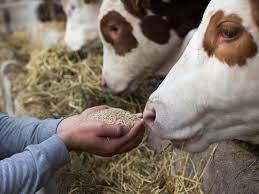Deadline: 02 June 2023
- Background
Agriculture is the single largest contributor (~30%) to overall Greenhouse Gas (GHG) emissions in Ireland accounting for the majority of methane emissions produced primarily due to ruminant livestock production. Methane, a GHG 28 times more potent than carbon dioxide, is released as a by-product of rumen microbial fermentation and from stored manure and slurry on farm. Under recent national legislation, Ireland has committed to reduce GHG emissions from agriculture by 25% by 2030, compared to 2018 levels. Hence there is an urgent requirement for innovative strategies to ensure that these targets are met.
The use of feed additives has shown great potential in reducing methane emissions in ruminants. However, in a range of international reports it can be concluded that despite extensive research conducted over a few decades, the number of additives that deliver substantial reduction is very limited and have not reached the market yet.
A very recent assessment coordinated by the Global Research Alliance for Agricultural Greenhouse Gas emissions (GRA) and other international initiatives has shown that the global livestock industries have a very limited suite of emerging feed additives suitable for enteric methane suppression and many constraints have been identified: a poor understating of the efficacy, lack of knowledge on the modes of action, uncertainty about persistency of effects and insufficient research in practical applicability in different grazing systems. There is also a need to understand the mechanism of action of rumen microbes in response to these feed additives.
- Project Aim
In this studentship on Feed Additives, funded by the Department of Agriculture, Food and the Marine (DAFM), it is aimed to develop and test methane-mitigating feed additives for pasture based production systems contributing Irish data to the International GRA Feed Additives Flagship
Specifically, in this PhD project we will investigate the potential of novel anti-methanogenic feed additives, particularly delivered in a slow-release or bolus format for pasture based production systems. These will be evaluated in vitro and in animal based in vivo trials. The successful candidate will learn state of the art in vitro, animal
science, methane measurement and animal performance skills and laboratory based scientific approaches such as rumen microbiology and bioinformatics skills to provide a fundamental understanding of mechanism of action of various feed additives employed to reduce methane emissions from agriculture.
II. Requirements
- Applicants should have a primary degree (First or upper Second Class Honours) or M.Sc. in an appropriate discipline (e.g. microbiology, biological science, animal science, biotechnology, etc.).
- The successful candidate should be highly self-motivated and be prepared for some field work for sample collection, laboratory work
and microbiological and molecular analyses using bioinformatics and biostatistics. - English require a minimum score of IELTS 6.05 for entry into postgraduate programmes.
III. Award
- The PhD Scholarship is part of a joint research project between NUIG and Teagasc, which is funded by the Global Research Alliance Feed additives Flagship administered in Ireland under the auspices of the Department of Agriculture, Food and the Marine.
- The student will be registered at NUIG, but based mainly at the Animal and
Bioscience Research Department, Teagasc, Grange, Co. Meath but will also enrol in modules and spend some time at NUIG. - The student will be under the joint supervision of Prof. Vincent O’Flaherty (NUIG) and Prof. Sinead Waters (Teagasc). The scholarship will commence in October 2023.
- The 4-year Scholarship provides a flat rate stipend of
€18,500 plus up to a maximum contribution to university fee of €6,000 per annum. - Informal contact to make enquiries about the PhD is welcome to Prof. O’Flaherty ([email protected] ) or Prof. Sinead Waters ([email protected]).
IV. Application Procedure
- Please send a one-page letter briefly outlining your reasons for applying for this PhD and a current two-page CV detailing your education and research experience, and including the names of two referees to Prof Waters ([email protected] ) and Prof O’Flaherty ([email protected] ).
- Closing Date for Applications: Friday 2nd June, 2023.
- Provisional Interview Date: 15th June 2023. PhD
- Start Date: 2rd October 2023.
